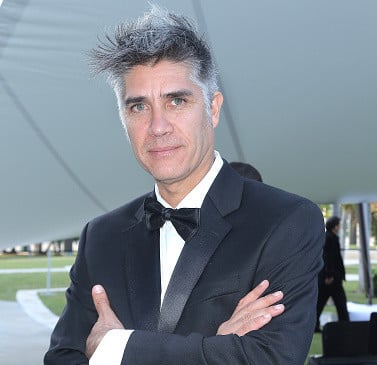
Photo by John Parra/Getty Images for Pritzker Architecture Prize.
Architecture’s most prestigious award goes this year to Chilean architect Alejandro Aravena.
He’s the head of Elemental, a firm which has erected structures in Chile, the United States, Mexico, China and Switzerland, including housing for the Chilean city of Constitución, which was hard hit by the 2010 earthquake and tsunami.
“Alejandro Aravena has pioneered a collaborative practice that produces powerful works of architecture and also addresses key challenges of the 21st century,” said Tom Pritzker, chairman and president of the Hyatt Foundation, which sponsors the prize.
UC Innovation Center, Anacleto Angelini, 2014, San Joaquín Campus, Universidad Católica de Chile, Santiago.
Photo: Nina Vidic, courtesy Elemental.
“His built work gives economic opportunity to the less privileged, mitigates the effects of natural disasters, reduces energy consumption, and provides welcoming public space,” Pritzker said. “Innovative and inspiring, he shows how architecture at its best can improve people’s lives.”
Elemental has designed more than 2,500 low-cost residential units using an approach called “incremental housing,” in which, according to the prize announcement, “the design leaves space for the residents to complete their houses themselves and thus raise themselves up to a middle-class standard of living.”
Among the several buildings Aravena has designed at the Universidad Católica de Chile in Santiago are schools of architecture, medicine, and mathematics, as well as the striking “Siamese Towers,” erected in 2005.
Siamese Towers, 2005, San Joaquín Campus, Universidad Católica de Chile, Santiago.
Photo: Cristobal Palma, courtesy Elemental.
Aravena has also designed schools, a children’s park, university dormitories, and office buildings, and created a design called “chairless,” which uses a strap to assist people to sit on the ground more comfortably by supporting their legs.
Chairless, 2010, design for Vitra.
Photo: Nicole Bachmann, courtesy Elemental.
It’s been a good year so far for the award-winning architect. Aravena, 48, is the director of the upcoming Venice Architecture Biennale, titled “Reporting from the Front.”
He’s also been an instructor at some august schools, having served as a professor at the Harvard Graduate School of Design, the Istituto Universitario di Architettura di Venezia, the Architectural Association in London, and the London School of Economics. Publishers Electa, Hatje Cantz, and Toto have all published monographs on his work.
Aravena is also very familiar with the inner workings of the prize; he was a member of the jury from 2009 to 2015. German architect Frei Otto won the prize last year, two weeks after his death. The 2014 winner was Japanese architect Shigeru Ban. Among the other previous laureates are Tadao Ando, Frank Gehry, Zaha Hadid, and I.M. Pei.
“The prestige, the reach, the gravitas of the prize is such that we hope to use its momentum to explore new territories, face new challenges, and walk into new fields of action,” Aravena said in a statement.
The 41st Pritzker Prize will be awarded in a ceremony at United Nations Headquarters in New York on April 4.